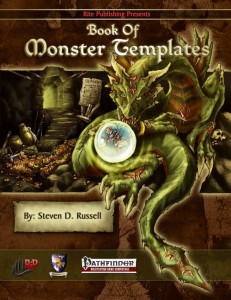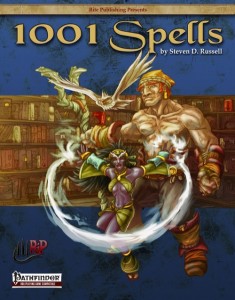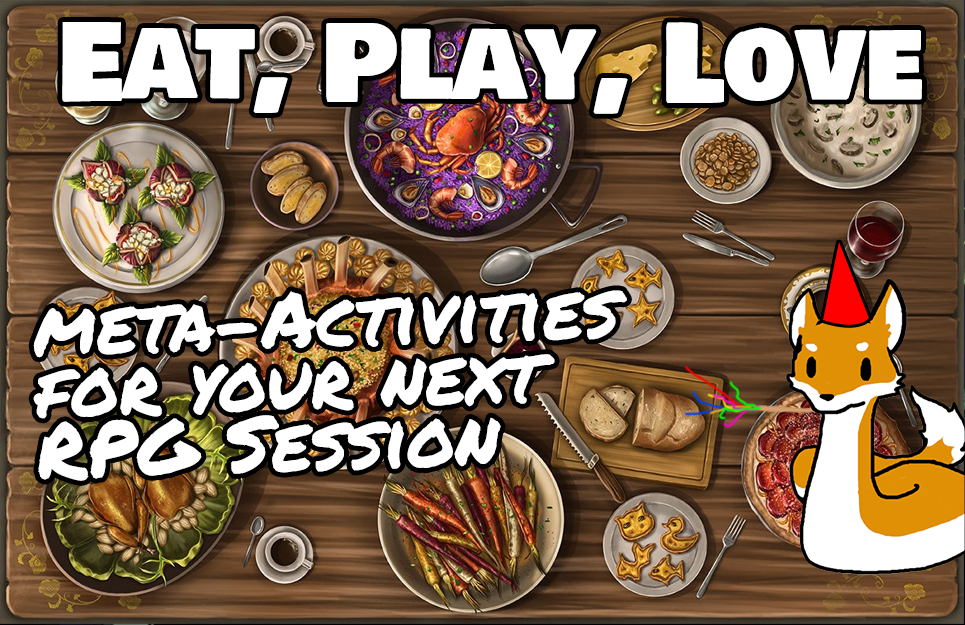In the first installment of Third Party People, we speak with Steve Russell of Rite Publishing. We first spoke with Steve in 3.5 Private Sanctuary episode 103, and Know Direction episode 5.
Third Party People is a twice monthly series on the people behind the third party publishers that innovate new options for the Pathfinder Roleplaying game, and provide hungry young freelancers a venue for their creations.
PC: What is Rite Publishing all about?
Steve Russell: That is a complex question, I could boil it all down to a good sound bite, but I think Rite Publishing is too complex for a single sentence. I have often joke about doing things “The Rite Way” but really I look at the market, do research, talk to my customers, talk to my staff of freelancers, look for inspiring and smart ideas and at the end of the day I make the call. My only real guiding principle is to create high quality and innovative gaming products that we deliver on time at a fair price.
PC: What three products embody Rite Publishing’s mission statement, and how?
The products that best embody Rite Publishing are The Breaking of Forstor Nagar, The Book of Monster Templates, and 1001 Spells.
The Breaking of Forstor Nagar from a customer stand point it’s brilliant; it has an amazing story created

by ENnie award winning game designer Ben McFarland that allows PCs to serve as a rescue team, making hard decision about who to save and who to leave behind. Because it is an entire city, you cannot save everyone. Then it has the amazing cartography of Jonathan Roberts who just finished up the poster maps for George R. R. Martina’s Lands of Ice and Fire. If you have seen the Minecraft version of King’s Landing, it’s based on Jonathan’s maps. It is also available for use with the free online virtual tabletop Maptools, and was designed specifically for that purpose. In addition, Cubicle 7, our print/distribution partner, did a full-color print run so you can get it in any major FLGS. Finally, they are part of the Bits and Mortar program so if you can show proof of purchase (say your recipient from Amazon) or you buy it at a place like Paizo, you get the PDF and Maptool files as part of the gig.
From a production standpoint, I love Breaking because I had nothing to do with it; its development was handled by Jonathan Roberts with the assistance of Ben McFarland. All I did was pay everyone and handle the marketing side of things. This is because I refuse to be a micromanager. You hire good people and you trust the fact that you hired good people (preferably people who are better than you are) and you trust them to do the job, or you fire them and hire better people. We have a number of projects like this and I love that they have all reached the level of quality I want and have been on time.
1001 Spells, this was a dream of mine, to make it so that a spell caster never had to cast the same spell twice. That GMs would always be able to surprise and create a sense of wonder in their players with an unknown spell, while not breaking the game.
The Book of Monster Templates flavor text is written from the monsters’ points of view. This is something I love to do with our products, when it comes to game mechanics we are clean and concise, but our flavor is always from a unique point of view, immersive if you will. It is not fluff; it actually serves the game helping people role-play better by getting them in to character so to speak, helping them with their willing suspense of disbelief in a fantasy world.

PC: How has Rite Publishing separated itself from the other third party publishers?
By creating modular but non-generic products and incredibly useful tools; Coliseum Morpheuon starts at 15th level, and is on the plane of dreams, so just as someone finished an adventure path, they can go right into this adventure, does not matter which Adventure Path that is, or what setting you’re using. T. H. Gulliver’s series of Haunts are another fine example of engaging flavor text that creates an immersive feeling of being in a wonderful world, inspiring ideas on how to use solid game mechanics. We also created a very solid release schedule for ourselves. When we first started out we released every month on the first of each month, then the 1st and the 15th, and now we release every week with 2-3 offerings on the first. There is also our free e-zine Pathways where we offer something free every month, and are up to issue number 23 now.
PC: Between Demiplane of Gaming, your video cast with Owen KC Stephens, and Unfettered Development, Rite Publishing’s podcast, you are heavily involved in interactive media. What place does it have in Rite Publishing’s marketing model?
Transparency, trust, and ownership. I want our customers to feel like they are a part of what I am doing and why I am doing it, not because it is good marketing but because it is how we operate, I listen to my customers, their great ideas, and their bad ideas. One thing I have learned about using customers as a sounding board is that they are smart and creative people and even their worst idea can inspire you to the best idea you will ever have. This requires that you be transparent, that you earn the trust of your customers, and that when you make a mistake you own up to it, you don’t make excuses, you say you made a mistake and you show how you’re going to make a customer feel whole again.
PC: Having a video cast with the publisher of a rival third party publisher might seem like sleeping with the enemy to some people. What is your relationship with other third party publishers for the Pathfinder Roleplaying Game, and how does that work in Rite’s favor?
They are my colleagues, I do not see them as my competition, I see them as the people I hang around the water cooler with, especially the people who do this as their day job, like Owen K. C. Stephens. I want a rising tide that floats all boats. I want Paizo to hire an editor to comb through the third party material and choose the best stuff and make it part of the core rules. They have already done this with pieces of the Tomb of Horrors, and a number of Paizo products have used the Advanced Bestiary. I also feel I should be putting my money where my mouth is, so Rite Publishing has produced products like 101 Renegade Class Feats or The Secrets of Renegade Archetypes that support third party publisher classes, as well as incorporating material from 3PP into our Faces of the Tarnished Souk NPC Collection. You do not reinvent the wheel you find the best wheel out there and you put it on your car, this is no different from Linux making use of the best source code that third parties develop.
PC: What is your gaming background, and how did you come to be so invested in the Pathfinder RPG?
I started playing Marvel Super Heroes the old FASARIP system, my first GM was Steven Schend at a Chicago Comicon. After that I started playing D&D and fell in love with the Forgotten Realms. I became one of those guys who knew all the lore. It was during this time I learned about Amber Diceless and feel in love with that system. When 3rd edition came along I was slow to convert but my players pushed me and I went, soon I was really involved in the fan community of the d20 Wheel of Time RPG, and they pushed me to become a freelancer.
I love Pathfinder because it did everything Rite that WotC was doing wrong in the transition to 4th Edition. At the time I was producing product for Monte Cook’s Arcana Evolved. Paizo’s awesome relationship with 3rd parties, having been one themselves, made it all the easier. So did the wave of popularity.
PC: What are the greatest challenges you face as a third party publisher of the Pathfinder RPG?
Getting people, GMs especially, to try out third party material after the bad taste the 3.0 glut left in their mouths. 3.5 did not have that problem as the bad companies died and the good companies made the best products they ever would. I tell everyone to compare the 3.0 version of the Creature Collection and the 3.5 Creature Collection III. Do yourself a favor before you buy your first third party product. Go read the reviews, find out who people trust.
Me, I will buy anything with Owen’s name on it (Super Genius Games) , Greg Vaughn’s name on it (Frog God Games), Tim Hitchcock’s name on it (Oone Games), my list could go on and on. You want to know what makes that list unique is that these folks work for Paizo. People are too obsessed with companies in my opinion and not paying enough attention to who is creating their content.
PC: How do you ensure the highest quality possible for your products, from game balance to the writing itself?
It is really not that complicated: hire talented people (or be incredibly talented yourself) and then follow through with playtesting, editors and proofreaders. When you skimp on those for the sake of money (it is an economy line of inexpensive products) or for time (deadlines run way too close), the product will suffer. However, the more talent he or she has at the start, the less work you have to do on the backend.
PC: How has being a third party publisher impacted your home game and other design work?

Well they are my alpha playtest group but they have been long before I was doing design work professionally as I was always 100% homebrew. What they love about it is now rather than some print off they have a real book they can skim through, and they use the hell out of 1001 Spells, 101 Magical Weapon Properties, and other books like that. It probably suffers a little because I do not spend every day in between working on how to make my home game better and now I use our products or Paizo adventure paths to run games but they are still having fun, and ultimately that is what matters.
PC: What comes first: an idea or a mechanic?
Does not matter, sometimes I get an idea for a mechanic, and build say a monster template around it, sometimes a story idea comes into my head and I have to create a new mechanic for it, or pillage existing mechanics from an Open Gaming Content source. Again, I really believe in not reinventing the wheel, though you can make the wheel better by playing around with that content.
PC: What lessons have your experiences taught you about publishing?
I have a whole list of things I learned: Do not jump into your dream project when you first start your business. You have a lot to learn and you do not want to mess up your dream. Start as small as you possibly can, do it on a shoestring budget, do it digitally, and as Print on Demand. This is your learning process, once you the production part down, you can move on. I have also learned that while free is good people only value a product based on what they paid for it, this is even more so when it comes to perceived value. And my final bit of free advice, be smart about your margins and your costs. If you are not making money then you cannot continue to do cooler and cooler projects.
PC: What do you look for in a freelancer, and where have you found your strongest freelancers?
Experience is a good place to start your strongest freelancers work for other people too, the best judge of future performance is past performance. If someone has done previous work, you can go read it. Recommendations from other freelancers are another good place to start. Nevertheless, what really makes a good freelancer is what makes a good employee: enthusiasm and dependability. I will take a person who does okay work, wants to get better, and turns it in on time over a talent that is always late any day of the week, because I can work with the okay guy to make him better. I can’t work with a guy who does not show up.
PC: If you could change one thing about Pathfinder, what would it be?
That they did something like “The Year’s Best of Pathfinder Compatible” even if it was just a PDF product like Pathfinder Society Scenarios. If it was a Kickstarter to pay for the editor and art, I would sign up.
As a GM, I would like to see an adventure path about being a true hero, being the knight is shining armor, high honor, which demanded virtuous characters. That when you give them a choice of saving one person or another, they take a third option and still try to save both because it’s the right thing to do. The adventure paths to me all have too much of alliances with evil folks simply because it is easier than doing the right thing and the people who do good suffer for it. I would like to see one where doing questionable and evil things has consequences too.
PC: What is a highlight of your experience as a third party publisher?
Having Wes Schneider contact me out of the blue about doing work on Jade Regent based on the work we did on Heroes of the Jade Oath. That was an amazing feeling, to have been sought out rather than seeking out a job. Wes could ask for my first-born child and I would have to think about it first.
PC: One day you wake up and all your goals for Rite Publishing have been met. What does that day look like, and where do you go from there?
That day looks like I am writing only one project instead of 3 or 4 and that we have our own gaming product, which is nearly as popular as Pathfinder is. We are developing our line of products based on Fate and the system that was used to run Amber Diceless Roleplaying. We have our Kickstarter for our first novel Lost In Dream by Matt Banach. From there I would like to get into other forms of gaming media and doing something with PC gaming on the Steam platform.






Leave a Reply